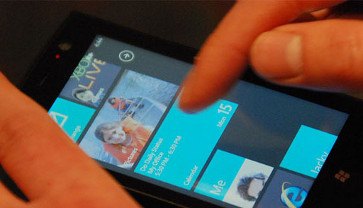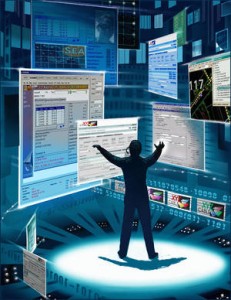Windows 8 as part of a new personal computing device concept
 Using "week of Windows 8 on Habr" I want to share my findings.
Using "week of Windows 8 on Habr" I want to share my findings. The topic started as an answer to this comment, but as a result it grew, and I decided to publish it separately.
For those who do not want to read the commentary and background, I’ll inform you that one of the commentators was asked the question: “What, in fact, is the concept of Metro UI? Flying multi-colored bricks? "
From my point of view, this is the concept of a tablet (do not find fault with the word only - it can be a smartphone, a watch: i.e. anything productive and small) as the onlydevices. I left home - I took a tablet with me. I came to work, with one movement I connected a monitor, keyboard, mouse (by the way, not a fact about the mouse, maybe without it) - you work. I went somewhere further - I took with me and at the same time I always have the same functionality .

Yes, I agree with certain exclamations that there were such ideas and devices before. But then there wasn’t the main thing: applications (and especially the interface!) That would support all this with ease of use.
Very important: so far everyone was afraid to touch the PC. Played with tablets, communicators and PDAs. Moreover, they tried first to bring such - mobile - devices to the ideology of the PC interface, it didn’t work out - they started to experiment further (and, by the way, achieved quite good successes, but this is a different story). But they didn’t touch the PCs, it was something sacred. Fundamentally, nothing was done in the mainstream with an interface since the advent of graphical environments - with Macs and then Win. Those. for almost 30 years of operating graphical interfaces on a PC, nothing has changed dramatically. It’s the same with the internals of the software, but I don’t even want to get into it - they will probably cling to the words and the holivar will rush. I write this not for argument.
But just think about the idea itself: modern small “computers” become so powerful that they are able to exist independently, not backed up by the power of the “big brother”. You will say: “Well, so what, I already on my own insert the name of the device calmly do without a PC.” Yes, of course! But try on these devices to seriously work with the accounting program, write large text in a text editor or work in a spreadsheet processor - I'm sure you will fail. They are not intended for this, although their performance often allows all this to be done! They ... I don’t know ... as if unfinished! As correctly noted in the article , “Windows 8 makes personal computers out of tabletsrather than fancy web browsers for five hundred euros ”(almost a quote, the word“ five hundred euros ”doesn’t sound very good). Together with software changes (for example, the source code will initially be compiled immediately under x86 and under ARM, and Metro applications with minor changes can be compiled under Windows Phone 7; there are many more changes, but, as I already mentioned, I don’t want to this now stop in more detail) it combines two types of devices.
I don’t know whether Microsoft will shoot this idea, what will be the practical implementation at the time of release, and the like. Absolutely there will be a lot of screams about compatibility, there will be exclamations "And my favorite toy is 3% slower, Windows 8 suxxxx (x), Microsoft must die!". But one thing I know for sure - for the first time, an attempt has been made to combine desktop and mobile operating systems in one bottle. For the first time, it will not be a temporary bridge, but a pretty decent bridge to replacing a PC in its modern form with a new type of personal computing device, a new one from the point of view of usability. When you don’t need to choose between mobility and usability. And no matter how much I love Microsoft sometimes, they did it first. And they put a lot on the line. Of course, if they don’t have this idea, it’s unlikely that the company will die, there’s too much survivability,
However, in any case, such a concept is a concept of the future. 100%!
That is my opinion.
A small disclaimer.
Personally, I’m not particularly enthusiastic about Win8 on my old laptop: it’s bad with firewood, it’s hard without a touch screen, etc. - but that does not change the main thing. At one time, Apple took a serious step by releasing MacOS X and emulating an environment for executing old code in it. Microsoft went further - it retained the ability to work win32 applications and gave new tools. And now this is a given - with Metro UI, with the Metro API and with Metro Applications, now everyone lives, and win32 is already past. No options.
PS I hope you do not need to mention that Metro is not only a UI, but a full-fledged application execution concept?
PPSThe desktop interface is an interface, you can turn off the Metro UI as the main screen, but you can’t get away from Metro applications. And where are the applications, there is the interface.
And the last postscript : there is nothing revolutionary about the idea voiced above, it exists for a long time. But here is the practical implementation of this concept at such a large-scale level and the company of this level is the first.
UPD People! The same comments on the same topic make me write again: Windows 8 and Metro UI are not only a new interface! It is also the new WinRT runtime !
